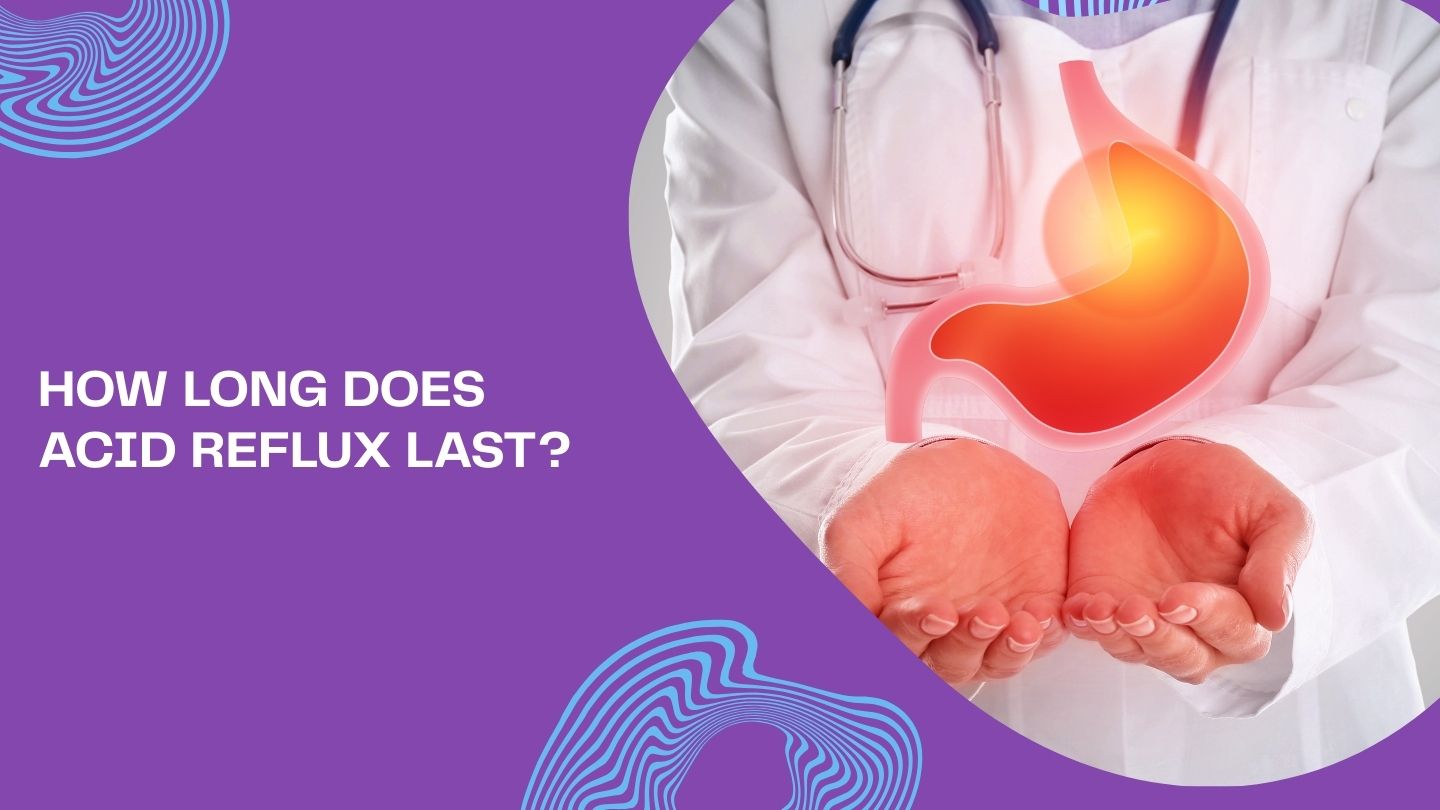
How Long Does Acid Reflux Last?
Acid reflux can be an uncomfortable and frustrating experience, leaving many wondering how long the symptoms will last. The duration can vary, lasting anywhere from a few minutes to several hours, depending on various factors. In this blog, we’ll dive into what influences the length of acid reflux episodes and share practical tips to help you find relief.
Key Takeaways
- Acid reflux episodes typically last between 2 and 4 hours, but individual factors such as diet and health can influence duration.
- Lifestyle choices, including diet, physical activity, and stress management, play a critical role in managing and reducing acid reflux symptoms.
- Long-term treatment for chronic acid reflux may require a combination of lifestyle changes and prescription medications to prevent severe complications like esophageal cancer.
Understanding Acid Reflux Duration
Have you ever wondered, “How long does heartburn last?” The duration of acid reflux episodes can vary widely. Typically, an episode might last from a few minutes to several hours, depending on various factors. For most people, heartburn symptoms associated with acid reflux generally persist between 2 and 4 hours during digestion. This duration can feel like an eternity when you’re experiencing discomfort, but understanding what influences this time frame can help you manage your symptoms better.
The variability in acid reflux duration is significant. It’s influenced by individual differences, such as how quickly food passes through your digestive system and your overall health condition. Some people might experience relief within a couple of hours, while for others, symptoms could linger much longer. This is why it’s crucial to pay attention to your body and recognize patterns in your symptoms.
Several factors can significantly impact how long acid reflux symptoms persist. Diet plays a crucial role; certain foods can exacerbate symptoms and prolong discomfort. Additionally, individual health conditions, such as obesity or gastrointestinal disorders, can affect the duration and severity of acid reflux. Knowing these factors allows you to customize your approach to managing acid reflux more effectively.
The next sections will explore specific factors affecting acid reflux duration and discuss both immediate and long-term relief strategies. A thorough understanding of these elements helps in navigating acid reflux and finding ways to reduce its impact on daily life.
Factors Affecting Acid Reflux Duration
The duration of acid reflux isn’t just a roll of the dice; several identifiable factors play a pivotal role in how long symptoms last. One major factor is diet:
- Consuming certain foods like mint, fatty items, and spicy dishes can trigger acid reflux and extend the duration of symptoms.
- It’s not just what you eat, but how much and when you eat that matters.
- Eating beyond fullness or snacking late at night can exacerbate the onset of gastroesophageal reflux disease (GERD).
Another critical factor is lifestyle habits:
- Physical inactivity is linked to a higher incidence of GERD, while maintaining an active lifestyle can help reduce symptoms.
- Smoking and alcohol consumption are positively correlated with the occurrence of GERD symptoms.
- Quitting smoking can improve acid reflux by enhancing the function of the lower esophageal sphincter, thereby reducing the likelihood of stomach acid flowing back into the esophagus.
Psychological stress is a less obvious but equally significant factor. Anxiety and depression can worsen acid reflux symptoms. Managing stress through activities like yoga, meditation, or other relaxation techniques can make a significant difference. Poor sleep quality is another contributing factor, as it is linked to an increased risk of GERD. Ensuring a good night’s sleep by maintaining a regular sleep schedule and creating a comfortable sleeping environment can make a notable difference.
Weight management is also crucial. To help control GERD and treat GERD, consider the following:
- Reduce excess weight, especially around the abdomen, to lessen pressure on the stomach and assist in losing weight.
- Eat smaller, more frequent meals instead of large meals to aid digestion and mitigate heartburn.
- Maintain an elevated sleeping position to help prevent nighttime acid reflux and lose weight.
Recognizing and addressing these various factors can significantly influence the duration of your acid reflux symptoms. This holistic approach involves dietary adjustments, lifestyle modifications, stress management, and weight control. Next, we will explore immediate relief options for unexpected acid reflux symptoms.
Immediate Relief for Acid Reflux Symptoms

When acid reflux hits, finding immediate relief becomes a top priority. Fortunately, there are several over-the-counter medications designed to alleviate symptoms quickly. Common options include:
- Antacids: work by neutralizing stomach acid, providing rapid relief.
- H2 blockers: reduce acid production and can be particularly effective when taken before a meal. In fact, up to 50% of patients experience symptom elimination when taking H2 blockers twice a day.
- Proton pump inhibitors (PPIs).
Lifestyle modifications can also provide quick relief from occasional heartburn. These include experiencing heartburn:
- Avoiding trigger foods such as chocolate, coffee, alcohol, mint, garlic, onions, and fatty foods to reduce heartburn and prevent symptoms from worsening.
- Eating smaller meals.
- Avoid lying down immediately after eating.
These dietary adjustments can help prevent acid reflux.
Another effective strategy for immediate relief involves maintaining an upright position after meals. Gravity helps keep stomach acid where it belongs, reducing the likelihood of acid regurgitation and the accompanying burning sensation. Additionally, wearing loose-fitting clothing can relieve abdominal pressure, further alleviating symptoms.
While these immediate relief options can be effective, they should not replace long-term management strategies. Regular reliance on over-the-counter medications without addressing underlying causes can lead to more severe issues down the line. Next, we will discuss sustainable approaches for managing acid reflux and preventing recurrence.
Read more: Top Foods to Avoid with Acid Reflux and GERD for Better Digestive Health
Long-term Management Strategies
For those dealing with chronic acid reflux, immediate relief is only part of the solution. Long-term management involves a combination of diet and lifestyle changes, along with appropriate medical treatment when necessary. Minor cases of gastroesophageal reflux disease (GERD) and gastro-oesophageal reflux disease can often resolve in under a month with appropriate lifestyle changes. However, moderate cases may require 6 to 12 weeks of treatment to achieve relief and allow healing, including instances of temporary acid reflux.
Dietary adjustments are fundamental in long-term management. These include:
- Eating smaller, more frequent meals to help reduce reflux by preventing a full stomach.
- Staying upright after meals and sleeping at an incline to prevent nighttime acid reflux by keeping the upper body elevated.
- Quitting smoking, as nicotine can weaken the lower esophageal sphincter, leading to the prevention of reflux.
Prescription-strength medications can play a significant role in managing chronic GERD. Common types include prescription medications such as:
- H2 receptor antagonists
- Proton pump inhibitors
- Promotility agents.
All of these help reduce stomach acid production and promote healing of the esophagus. The primary goals of treatment for GERD are to eliminate symptoms, heal esophagitis, and prevent relapse and complications.
The primary aim of GERD therapy is to control symptoms and prevent complications. By combining lifestyle modifications with medical treatments, individuals can achieve long-term relief and improve their quality of life. Next, we will cover when it is necessary to seek medical attention for more severe or persistent symptoms.
When to Seek Medical Attention
While many cases of acid reflux can be managed with lifestyle changes and over-the-counter medications, there are times when professional medical treatment is necessary. If you experience heartburn on most days or have difficulty swallowing, it’s important to visit a doctor. Persistent or severe symptoms could indicate a more serious condition that requires medical intervention.
If symptoms worsen or do not improve with over-the-counter medications, consulting a doctor is crucial. In such cases, a healthcare provider can evaluate your condition and recommend a more targeted treatment plan to relieve symptoms of chronic cough and other symptoms. In severe cases, a referral to a specialist may be necessary for further tests and treatments.
Severe symptoms of acid reflux can indicate serious health issues and should not be overlooked. Symptoms such as:
- Chest pain similar
- Significant weight loss
- Frequent vomiting is a red flags that warrant immediate medical attention.
Early intervention can prevent complications and improve outcomes. Additionally, symptoms of GERD may also present and should be considered.
Knowing when to seek medical attention is vital for effective acid reflux management. Next, we will explore the diagnostic tests commonly used to assess chronic acid reflux conditions. These tests can provide valuable insights into the severity of your condition and guide appropriate treatment.
Diagnostic Tests for Chronic Acid Reflux

Diagnosing chronic acid reflux involves a series of tests designed to evaluate the condition of the lower esophagus and the extent of acid exposure. One common diagnostic test is esophageal manometry, which assesses the strength and coordination of muscle contractions in the esophagus during swallowing. This test helps determine if the lower esophageal sphincter (LES) is functioning properly.
Ambulatory pH monitoring is another essential test. It involves:
- Placing a device in the esophagus to track acid exposure over a specified period, usually 24 to 48 hours.
- Providing detailed information about the frequency and duration of acid reflux episodes.
- Helping to confirm a diagnosis of gastroesophageal reflux disease (GERD).
Transnasal esophagoscopy is a less invasive procedure that uses a thin tube to examine the esophagus for signs of damage or inflammation. This test can identify conditions such as esophagitis or Barrett’s esophagus, which are associated with chronic acid reflux. Biopsies may also be performed during this procedure to check for cellular changes indicative of more serious conditions.
Understanding these diagnostic tests can alleviate some of the anxiety associated with undergoing medical evaluations. They provide crucial information that guides treatment decisions and helps manage chronic acid reflux effectively. Next, we will discuss the potential complications of untreated acid reflux and the importance of timely intervention.
Potential Complications of Untreated Acid Reflux
Ignoring or inadequately treating acid reflux disease can lead to significant health complications. One such complication is esophagitis, which involves inflammation and tissue damage in the esophagus. Over time, this can result in esophageal ulcers, bleeding, and scarring, making swallowing difficult and painful.
Chronic acid reflux can also lead to a condition known as Barrett’s esophagus. This occurs when the tissue lining of the esophagus changes to resemble intestinal lining due to prolonged acid exposure. Barrett’s esophagus significantly increases the risk of developing esophageal cancer. Regular monitoring is essential for individuals with this condition to detect any precancerous changes early.
The risk of esophageal cancer is notably higher in individuals with chronic heartburn. Research indicates that this risk is 43.5 times greater in people with long-term heartburn compared to those without. This underscores the importance of managing acid reflux effectively to prevent serious complications.
In summary, untreated acid reflux can lead to severe medical problems, including esophageal cancer. Timely and effective management is crucial to avoid these complications and maintain overall health. Developing a clear understanding of acid reflux GERD is essential for identifying symptoms early and seeking appropriate treatment. In the final section, we’ll summarize the key points discussed and provide a concluding statement to reinforce the importance of managing acid reflux.
Read more: What Happens if Acid Reflux and GERD Go Untreated?
Managing the Duration of Acid Reflux
The duration of acid reflux can vary widely, depending on its cause, individual health factors, and how promptly it’s addressed. Occasional episodes may resolve quickly, while chronic acid reflux may require long-term management and lifestyle changes. Recognizing persistent symptoms and seeking medical advice is essential to prevent complications and restore comfort.
At Wellstar Comprehensive Bariatric Services, we are dedicated to providing personalized GERD acid reflux treatment in Cobb County, Smyrna, Austell, LaGrange, West GA, and Marietta. Our experienced team offers the latest treatment options and ongoing support to help you manage your symptoms and improve your quality of life. Connect with us today to start your journey toward lasting relief.
Frequently Asked Questions
How long does a typical acid reflux episode last?
A typical acid reflux episode lasts from a few minutes to several hours, with heartburn symptoms often persisting for 2 to 4 hours during digestion.
What foods should I avoid to reduce acid reflux symptoms?
To effectively reduce acid reflux symptoms, avoid trigger foods like chocolate, coffee, alcohol, mint, garlic, onions, and fatty foods. This will help manage your discomfort more effectively.
When should I seek medical attention for acid reflux?
You should seek medical attention for acid reflux if you experience heartburn most days, have difficulty swallowing, or if your symptoms worsen or do not improve with over-the-counter medications.
What are some long-term management strategies for acid reflux?
To effectively manage acid reflux long-term, consider dietary adjustments, lifestyle changes like eating smaller meals, and avoiding smoking. These strategies can significantly reduce symptoms and improve quality of life.
What are the potential complications of untreated acid reflux?
Untreated acid reflux can result in severe complications like esophagitis, Barrett’s esophagus, and even esophageal cancer. It’s essential to manage the condition promptly to avoid these risks.
